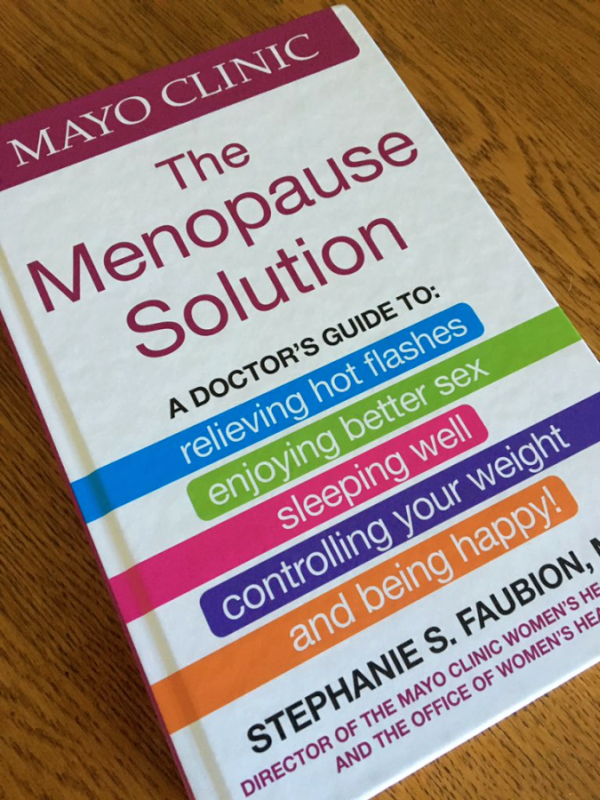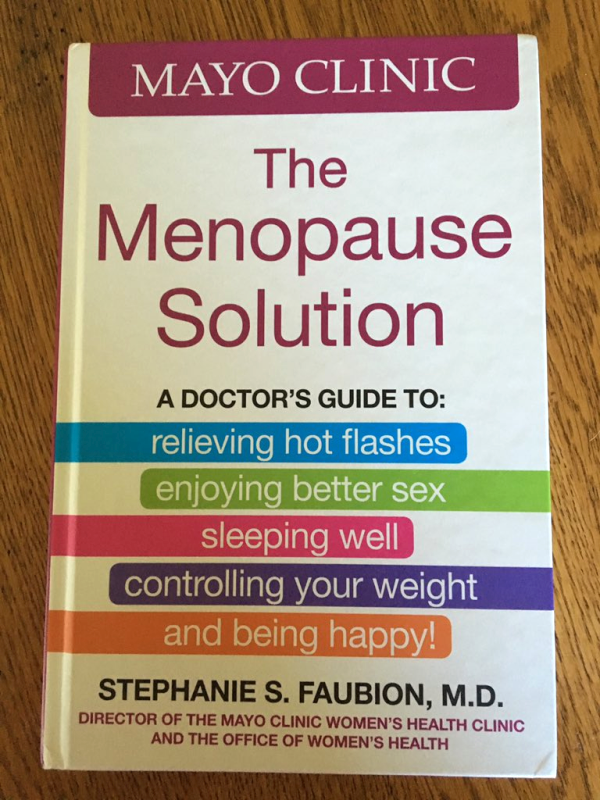
I remember, while growing up, seeing much-loved women in my family go through something they’d sternly refer to as “the change.” The sternness always seemed to imply, “Don’t ever come here… save yourself!”
As I got older, I noticed other women going through this change – a change that, by then, I knew by its given name, Menopause. I also noticed it wasn’t something you could, officially, save yourself from. Not if you lived long enough – which is, of course, the goal.
Menopause. That one word carries a lot of weight, doesn’t it. It’s almost as if it comes with its own soundtrack… similar to the shark’s approach in Jaws. Kind of makes you wonder why ‘pause is part of the word. Pause? Pause from what?! It’s more like a stop, if you ask me. Menostop would’ve made a lot more sense.
Full disclosure – I experienced perimenopause and menopause at a very early age. I actually slid into menopause in my late 40’s. Before I get to my review of a must-have manual for menopause, Mayo Clinic: The Menopause Solution, I want to simply give my own quick experience(s) with perimenopause and menopause. Why? To give hope to those of you headed in my direction – it’s not the end of the world, ladies.
In fact, about a year ago, I caught a doctor very much off guard. He asked, “You haven’t entered menopause yet, have you?” I replied, “Actually I have and I have nothing bad to say about it. We’re getting along just fine!” He laughed and looked pretty shocked – right before giving me a high-five.
My personal experience:
- The year of “perimenopause” was more of a deal than actual menopause. I’d get uncommonly emotional over little things. Commercials would make me cry for a good 10 minutes.
- No hot flashes. Thank God! I’d seen my mom struggle with these and I honestly prayed, off and on over the years, that I’d never succumb to their evil ways.
- No difficulty sleeping.
- No mood swings.
- Weight gain? Oh, yes. I found myself eating less than ever – yet I suddenly had the superhero ability to gain weight overnight. In places weight never dared to show up prior to menopause. While I was relieved not to experience the mood swings, interrupted sleep, or hot flashes – the fact that weight became harder than ever to lose or manage was a very unwelcome guest.
Did you know that, these days, we are spending 1/3 of our lives in menopause?! 1/3! It only makes sense that we should be on the lookout for what to expect and, even more importantly, what we can do about them when they show up on our doorstep.
One of the things I love most about Mayo Clinic: The Menopause Solution is the fact it acknowledges, respects, and adheres to a fundamental truth – one size does not fit all. I loathe books that come from a standpoint of, “This works for me… this will work for you.” No, no, and no. We are all different and we each require our own techniques, tweaks, diets, and “approaches” to menopause.
The author of The Menopause Solution, Stephanie S. Faubion, M.D., gets that as well as I’ve ever seen anyone get it and she delivers on the promise of the book’s title – a solution.
Confront menopause symptoms such as weight gain, mood swings, and low sex drive with clear advice from a trusted source.
Mayo Clinic The Menopause Solution is the definitive guide to making your life change a positive one. Drawing on the latest information, leading women’s health expert Dr. Stephanie Faubion covers common questions, lifestyle strategies, and treatment options.
Unlike other books, Mayo Clinic The Menopause Solution is comprehensive, easy to navigate, and authoritative.
Features include:
- A complete look at what happens to your body before, during, and after menopause.
- Up-to-date information on over-the-counter medications, nutritional supplements, and hormone therapy
- Sidebars, lists, and summaries to make finding information a cinch
Dr. Faubion knows that what works for one woman doesn’t necessarily work for another. In approachable terms, she presents a balanced, unbiased overview of what to expect in midlife and beyond. You’ll find accurate information on perimenopause, premature menopause, menopause symptoms, long-term effects of estrogen loss, and a wide variety of therapies to enhance health.
Professional, accessible, and essential for any woman entering menopause, Mayo Clinic The Menopause Solution offers everything you need to take charge of your own health and get the best care from your doctor.
As one of the nation’s leading experts on menopause who regularly treats women with menopause-related conditions, Dr. Faubion combines years of research into a comprehensive, easy-to-navigate reference tool for women seeking answers about the stages before, during, and after menopause.
Drawing on the latest research, Dr. Faubion debunks common myths and misconceptions, provides answers to everyday questions and offers practical lifestyle strategies and treatment options.
Did You Know?
- An estimated 6,000 US women reach menopause every day.
- By 2020, the number of women who will be older than 55 is estimated to total 46 million.
- With increasing life expectancy, many women will spend up to 40% of their lives in the postmenopausal stage.
- Half of women who reach age 50 will live to be at least age 80.
- Menopause symptoms can last a decade or more. Although this seems discouraging, Mayo Clinic: The Menopause Solution offers priceless tips on how to either completely eliminate or “temper” the symptoms.
- Many symptoms of menopause (including the infamous hot flashes) are brought on by personal “triggers.” Dr. Faubion helps you identify these triggers and shows you the escape route around them!
- Weight gain is one of the most common symptoms or side-effects of menopause. Dr. Faubion explains WHY this is and clearly lays out what can be done about it.
Menopause and Your Heart
Heart disease is the number one killer of both men and women. One of my favorite chapters in The Menopause Solution is the one dealing with heart disease. Dr. Faubion cleared up a lot of questions I had in my own mind about menopause and its relationship with the heart.
From Mayo Clinic: The Menopause Solution:
Before menopause, women are less likely to have heart disease than are men of the same age. But once you enter menopause, your risk of heart disease increases significantly. Menopause itself doesn’t cause heart disease, but declining levels of estrogen may play a role. Estrogen is thought to have a protective effect on a woman’s blood vessels….
Going through menopause early has an even greater effect on your chances of developing heart disease. If you’ve experienced menopause between the ages of 40 and 45, your risk of heart disease doubles compared with that of women your age who haven’t yet gone through menopause.
All of this news might be unsettling, but you can do a great deal to reduce your risk of heart disease. Many of the most significant risk factors for heart disease are ones you can control.
The author goes on to clearly give you a course of action to prevent heart disease. It’s always encouraging to realize that we have a great deal of control over many things that could potentially harm us.
{Review Continued Below….}

Your Brain and Menopause
Another favorite chapter was the one dealing with the brain. Many times, over the past few years, when I lose a train of thought, I picture the man in the commercial with a fried egg – “This is your brain on drugs..” (hopefully you know the commercial, otherwise you’ll think I’m nuts right now). Instead of the man with the fried egg, I imagine myself standing in the middle of a field (definitely holding one of my cats) saying, “This is your brain on menopause…”
I’m nothing if not dramatic.
I was greatly relieved to read that this is very normal and that, in fact, almost every other woman experiences the same thing.
- What IS the word I’m looking for?!?! (my personal solution is to simply make one up)
- What was the name of the actress who was “Vera” in the sitcom Alice? (I lost two hours of sleep one night – I refused to nod off until my brain found the missing file)
- What was I about to say???
- WHERE IS MY CELLPHONE?!?! (the lost cellphone is the new lost keys)
From The Menopause Solution:
It’s been shown that estrogen does indeed have an influence on key aspects of brain processing and metabolism. Multiple studies have been launched in an attempt to tease out the link between the hormonal fluctuations of menopause and the cognitive symptoms that commonly occur during this period…
The chapter goes on to detail what happens in the brain during aging and menopause, how hormones affect the brain and, most importantly, how to keep the brain healthy. You even learn how to cross-train your brain!
A Few Other Chapters in The Menopause Solution:
- Taking Care of Your Body (hair problems/solutions, eyes, smile, skin – anti-wrinkle products are outlined and put into plain English – it’s easier to shop for something when you actually know what you should be looking for)
- When Menopause Comes too Early
- Embracing the Image in the Mirror
- Finding Balance and Happiness
- Keeping Your Bones Strong
- Caring For Your Breasts
- Hormones and Other Prescription Therapies
- When You Can’t Sleep
- Moods And You
- Hot Flashes and Night Sweats
- Body Changes from Head to Toe
- And more…
I can’t say enough about this book. One of the biggest benefits I’ve gotten from this book is the realization that many things I experience are not rare and isolated. There’s a great, great, great comfort in recognizing your own story in other stories.
Especially when they’re accompanied by solutions and tips you can use to make YOUR story a better place in which to live.
If you are approaching menopause or already live with it on a first-name basis, I strongly urge you to grab a copy of Mayo Clinic: The Menopause Solution – it is a life-changer and sanity-preserver.
